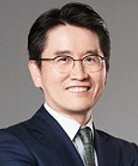'Lucky I wasn’t born as Korean'
'Lucky I wasn’t born as Korean'
Posted May. 29, 2017 07:28,
Updated May. 29, 2017 07:34
Japanese TV series “The Lonely Gourmet” showcases “eating shows” every week at famous restaurants. Here, the main character shows a universal appetite for global cuisines. He enjoys the delicacy of every country, including Korean, Chinese, Brazilian, and let alone Japanese. Still, he murmurs after eating a fish-shaped bun with a Japanese tea, saying “thanks goodness I was born as Japanese.” The phrase can also be heard frequently in other Japanese TV series and comic books as well.
A book titled “Luck I wasn’t Born as Korean” has been published in Japan. It was written by former Japanese ambassador to Korea Muto Masatoshi. It was the exact person who gave reckless remarks such as “there is no evidence of a forced emigration of comfort women” last December and updated an online column titled with the same title of his book in February. Indeed, the book is full of absurdity. As if he was Nostradamus, branded President Moon Jae-in still in his first few weeks as the “worst President” and a “pro-North Korean and anti-Japanese populist.” He also commented the recent impeachment and change of regime as “an act explicitly showing the ugly face (of Koreans) who are swayed by sentiment than logic.”
His recent criticism on Korea comes evermore shocking, as Muto was “mistaken” as a pro-Korean diplomat who worked in Korea for four times. For instance, he posted an article on the Embassy website titled “Korea is a true friend of Japan” in 2011, saying that he was very impressed by the heartfelt support from Koreans who “volunteered to rescue Japan as if the Japanese were their family or friends” during the great East Japan earthquake crisis. When invited as the chair professor at a Korean university in 2012, he even brought up phrases such as “a bridging role between Korea and Japan to promote Korea in Japan and correct misunderstandings of Japan in Korea.” Now, we are beginning to wonder what his “bridging role” really meant.
It is no surprise that the Japanese shows a sharp contrast between their true feelings (or Honne in Japanese) and desires and behaviors and opinions they display on public (or Tatemae in Japanese). Still, it is terrifying to find out a former diplomat once known as “pro-Korean” disclose his immature thoughts and mentality after revealing himself. Is this what they call an “elite” in Japan? Indeed, the gap between a “21st century forward-looking bilateral relationship” seems to widen further these days.







